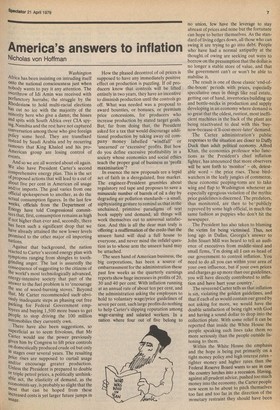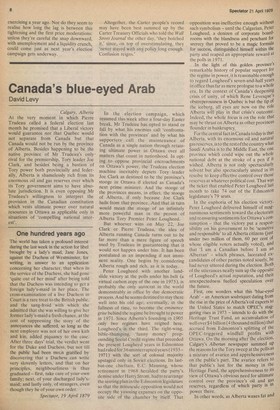America's answers to inflation
Nicholas von Hoffman
Washington Africa has been insisting on intruding itself onto the national consciousness just when nobody wants to pay it any attention. The overthrow of Idi Amin was received with Perfunctory hurrahs; the struggle by the Rhodesians to hold multi-racial elections has cut no ice with the majority of the minority here who give a damn; the hisses and spits with South Africa over CIA spying, Namibia and the rest have not captured conversation among those who give foreign policy some heed. They are transfixed instead by Saudi Arabia and by recurring rumours that King K haled and his proAmerican group are losing control of events.
And so we are all worried about oil again. We also have President Carter's second comprehensive energy plan. This is the set of proposed actions that will lead to a cut of about five per cent in American oil usage and/or imports. The goal varies from one official spokesperson to another, as do the actual consumption figures. In the last few weeks, officials from the Department of Energy have told Congressional committees that, first, consumption remains as high if not higher than ever and, secondly, there has been such a significant drop that we have already attained the new lower levels Promised to the other major oil importing nations.
Against that background, the nation reacted to Carter's second energy plan with sYMptoms ranging from shingles to toothgrinding anger. The last is assuredly the Consequence of suggesting to the citizens of the world's most technologically advanced, energy-intensive society that part of the answer to the fuel problem is to 'encourage the use of wood-burning stoves.' Beyond that, Mr Carter recommended such' obviously inadequate steps as phasing out free Parking for Federal Government employees and buying 1,500 more buses to get People to stop driving the 100 million automobiles they currently own. There have also been suggestions, so superficial as to seem frivolous, that Mr Carter would use the power previously given him by Congress to lift price controls 0, n domestically produced crude oil but only le .stages over several years. The resulting Price rises are supposed to curtail usage and/or encourage greater production. Unless the President is prepared to double or triple petrol prices, a politically unthinkable act, the elasticity of demand, as the economists say, is probably so slight that the Most that can be hoped from these increased costs is yet larger future jumps in usage. How the phased decontrol of oil prices is supposed to have any immediately positive effect on production is puzzling. If oil producers know that controls will be lifted entirely in two years, they have an incentive to diminish production until the controls go off. What was needed was a proposal to award bounties, or bonuses, or premium price concessions, for producers who increase production by stated target goals. But, far from doing that, the President asked for a tax that would discourage additional production by taking away oil company money labelled 'windfall' or 'unearned' or 'excessive' profits. But how do you define excessive profitability in a society whose economics and social ethics teach the proper goal of business as 'profit maximisation'?
In essence the new proposals are a tepid act of faith in a deregulated, free market. The engineer-President grumbles about regulatory red tape and proposes to save a minuscule number of barrels of oil a day by degrading air pollution standards — a small, asphyxiating gesture to remind us that in the unchained, primitive paradigms of text book supply and demand, all things will work themselves out to universal satisfaction. And this is all the dear man truly is offering: a reaffirmation of the credo that the unseen hand will deal a full house to everyone, and never mind the infidel question as to whose arm the unseen hand may be attached.
The seen hand of American business, the big corporations, has been a source of embarrassment for the administration these past few weeks as the quarterly earnings reports show huge increases in profits of 20, 30 and 40 per cent. With inflation running at an annual rate of about ten per cent, and the administration asking the employers to hold to voluntary wage/price guidelines of seven per cent, such large profits do nothing to help Carter's slipping reputation among wage-earning and salaried workers. In a nation where four out of five belong to no union, few have the leverage to stay abreast of prices and none but the fortunate can hope to better themselves. As the standard of living edges down, all those who can swing it are trying to go into debt. People who have had a normal antipathy at the thought of owing are seeking out ways to borrow on the presumption that the dollar is no longer a stable store of value, and that the government can't or won't be able to stabilise it..
The result is one of those classic 'end-ofthe-boom' periods with prices, especially speculative ones in things like real estate, getting out of hand, inventories building up and bottle-necks in production and supply developing in an economy where demand is so great that the oldest, rustiest, most inefficient machines in the back of the plant are being reactivated to deal with this 'buynow-because-it'll-cost-more-later' demand.
The Carter administration's public responses to the situation are closer to Daffy Duck than adult political economy. Alfred Khan, the economics professor who functions as the President's chief inflation fighter, has announced that more observers will be sent forth to 'monitor' — oh, detestable word — the price rises. These birdwatchers in the leafy jungles of commerce, these economic peeping-toms are to take wing and flap to Washington whenever an especially egregious violation of the mythic price guidelines is discerned. The predators, thus monitored, are then to be publicly reproved by some high official, in much the same fashion as puppies who don'/ hit the newspaper.
The President has also taken to blaming the victim for being victimised. Thus, not long ago in Dallas, Georgia's answer to John Stuart Mill was heard to tell an audience of executives from middle-sized and small firms, `I'm doing all I can as head of our government to control inflation. You need to do all you can within your area of your own influence, but if your own prices and charges go up more than our guidelines, you will have directly contributed to inflation and 'have -hurt your country.'
The reverend Carter tells us that inflation is sin, violating the golden guidelines, and that if each of us would contain our greed by not asking for more, we would have the double satisfaction of being right with God and having a sound dollar to drop into the collection plate. With some relief it can be reported that inside the White House the people speaking such lines take them no more seriously than the people outside listening to them. Within the White House the emphasis and the hope is being put primarily on a tight money policy and high interest rates — tighter money and higher rates than the Federal Reserve Board wants to see in case the country lurches into a recession. Having, against all prudent advice, pushed too much money into the economy, the Carter people now seem to be about to pitch themselves too fast and too far in the direction of the monetary restraint they should have been exercising a year ago. Nor do they seem to realise how long the lag is between this tightening and the first price moderations: unless they're careful the snap downward, with unemployment and a liquidity crunch, could come just as next year's election campaign gets underway. Altogether, the Carter people's record may have been best summed up by the Carter Treasury Officials who told the Wall Street Journal the other day, 'they botched it,' since, on top of overstimulating, they 'never stayed with any policy long enough. Confusion reigns.'







































 Previous page
Previous page